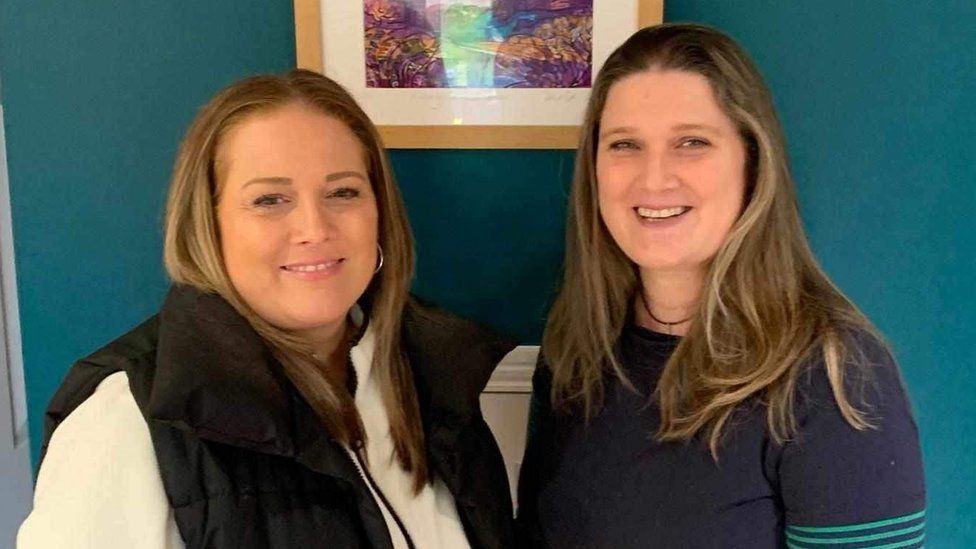 Image source, Family photo
Image source, Family photo
Rebecca and Angharad had heart attacks three days apart
Two sisters who had heart attacks just days apart have said more should be done to raise awareness of a condition that can be fatal.
Rebecca Lewis, 48, had a spontaneous coronary artery dissection (SCAD), when a tear appears in the wall of a coronary artery.
Although not conclusive, it is likely that her sister Angharad experienced the same thing three days later.
SCAD is a rare condition that cannot currently be predicted or prevented.
The majority of cases affect women in their 40s or 50s or those who have recently had a baby.
Rebecca, a teacher from Cardiff, was marking work in her classroom last November when she felt huge pressure on her chest.
The school's quick-thinking head teacher took Rebecca to the University Hospital of Wales in Cardiff, where she was told she had had a heart attack.
An angiogram a few days later showed that it had been caused by a SCAD.
What is SCAD?
A SCAD happens when the inner layers of a coronary artery tear away from the outer layer, restricting blood flow.
In some cases this can lead to a heart attack or cardiac arrest.
Symptoms can include chest pain, tightness or pain in the arms, neck, jaw, back or stomach; feeling dizzy or lightheaded; feeling tired or out of breath; nausea, and feeling sweaty or clammy.
Rebecca Lewis, 48, said she felt huge pressure on her chest while at work one day
Rebecca said she was lucky that the consultant who treated her had previously worked at Glenfield Hospital in Leicester, which is a leading centre for research into SCAD.
"The consultant that actually did my angiogram... had been trained to know what SCAD looked like on an angiogram and was able to pick it out with me," she said.
The morning after visiting her in hospital, Rebecca's sister Angharad also had a heart attack. An angiogram suggested she too had suffered a SCAD.
Angharad was treated at a different hospital, but Rebecca said she was adamant that Angharad should be checked for a SCAD.
Image source, Angharad Lewis
Image caption,Angharad had a heart attack three days after her sister
"They were happy to discharge me," Angharad recalled.
"So I was very fortunate that I had a big sister looking after me saying 'you need to get this test, you need to mention what has happened to me and what they found'.
"So, eventually, the consultants spoke to each other and I was sent down to Cardiff. If it wasn't for Becky, I would've been sent home not knowing why I'd had my heart attack."
There are currently 2,000 patients helping the research at Glenfield Hospital.
Prof David Adlam, who leads the research, said many cases go undiagnosed.
"We try to encourage our colleagues across the health services, who will be potentially seeing patients who might have SCAD, to think of it. Because if you're not thinking of it, then you may miss it," he said.
"When you have a conventional heart attack... generally it's caused by a fixed narrowing in the coronary artery, and we often treat that by stretching open that narrowing and inserting a stent.
"In SCAD patients we do the opposite," he added.
"We're trying to manage the artery to let it heal by itself. And the reason for that is that it's a different disease. It has a different underlying cause."
Rebecca and Angharad are still coming to terms with what happened to them.
"It's affected the whole family," said Angharad.
Image source, Angharad and Rebecca Lewis
Image caption,Angharad says the experience has affected the whole family
"I've been very fortunate to have support from friends. They've been coming here just because they are aware that I'm a bit nervous about doing things and being out and about."
Rebecca said the experience had knocked her confidence.
"It caused a lot of distress when it happened," she said.
"It was the last thing I was thinking at 48 years of age that I'd be having a heart attack."
Research into SCAD is currently funded by the Beat SCAD charity, although the Scottish government is also running a pilot project.
Prof Adlam hopes the Welsh government will do the same.
"We would very much like to work with our friends and colleagues in Wales to ensure that these patients are properly cared for," he said.
"It's really important to raise awareness," Angharad added.
"At the moment we are saying it's very rare, but if we're looking at my experience, maybe it's going undiagnosed. Becky came home with a diagnosis, with a label. Fortunately, I've ended up with the same, but it could have been very different."
The Welsh government said: "We expect NHS Wales to deliver care for acute coronary syndrome in line with professional guidelines from organisations such as the National Institute for Health and Care Excellence (NICE).
"For more rare cardiac conditions, NHS Wales is prepared to work with counterparts across the UK on research."
 (1).png)
 10 months ago
15
10 months ago
15


















